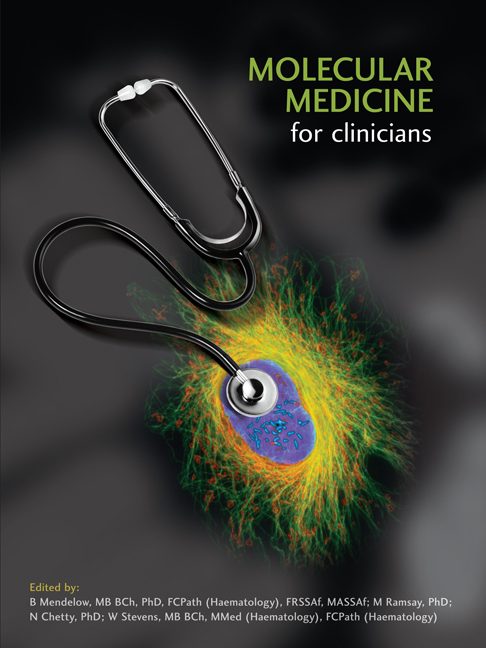Book contents
- Frontmatter
- Contents
- Foreword
- Acknowledgements
- Chapter 1 Introduction
- Keynote Essay 1: Defining Who We Are: DNA in Forensics, Genealogy and Human Origins
- Section 1 Principles Of Cellular And Molecular Biology
- Chapter 2 Digital Concepts in Molecular Medicine
- Chapter 3 The Anatomy and Physiology of the Genome
- Chapter 4 Molecular Cell Biology
- Chapter 5 Genetic Variation
- Chapter 6 Genes in Development
- Chapter 7 Tools of Molecular Medicine
- Chapter 7a Nucleic Acid Methods
- Chapter 7b Protein Methods
- Chapter 7c Cellular Phenotyping and Flow Cytometry
- Chapter 7d Molecular Cytogenetics
- Keynote Essay 2: The Human Genome
- SECTION 2 MOLECULAR PATHOLOGY
- SECTION 3 MOLECULAR THERAPEUTICS
- SECTION 4 RESEARCH AND THE CONTINUING EVOLUTION OF MOLECULAR MEDICINE
- Glossary
- Contributors’ Biographies
- Source Material And Recommended Reading
- Permissions And Credits
- Index
Chapter 7b - Protein Methods
from Chapter 7 - Tools of Molecular Medicine
Published online by Cambridge University Press: 04 June 2019
- Frontmatter
- Contents
- Foreword
- Acknowledgements
- Chapter 1 Introduction
- Keynote Essay 1: Defining Who We Are: DNA in Forensics, Genealogy and Human Origins
- Section 1 Principles Of Cellular And Molecular Biology
- Chapter 2 Digital Concepts in Molecular Medicine
- Chapter 3 The Anatomy and Physiology of the Genome
- Chapter 4 Molecular Cell Biology
- Chapter 5 Genetic Variation
- Chapter 6 Genes in Development
- Chapter 7 Tools of Molecular Medicine
- Chapter 7a Nucleic Acid Methods
- Chapter 7b Protein Methods
- Chapter 7c Cellular Phenotyping and Flow Cytometry
- Chapter 7d Molecular Cytogenetics
- Keynote Essay 2: The Human Genome
- SECTION 2 MOLECULAR PATHOLOGY
- SECTION 3 MOLECULAR THERAPEUTICS
- SECTION 4 RESEARCH AND THE CONTINUING EVOLUTION OF MOLECULAR MEDICINE
- Glossary
- Contributors’ Biographies
- Source Material And Recommended Reading
- Permissions And Credits
- Index
Summary
INTRODUCTION
In the post-genomic era, with sequencing of the entire human genome complete, there has been a great increase in our knowledge regarding the function of proteins encoded by the genome, the so-called proteome, and the role that aberrant protein expression and/or function plays in human disease pathogenesis. ‘Genomics’ refers to the comprehensive study of the function, interactions and dynamics of genes. In turn, ‘transcriptomics’, while having a similar objective, describes the function, interactions and dynamics of the genomic transcripts (i.e. mRNA, tRNA, rRNA and small RNAs such as miRNA and siRNA). ‘Proteomics’, by logical succession, describes the equivalent parameters for the complete set of proteins expressed by the genome through its transcripts. The entire set of proteins expressed by a particular cell/ organ ism constitutes its proteome. A number of variations on this theme are encountered increasingly in the literature. For instance, ‘metabolomics’refers specifically to the study of genes, transcripts and proteins involved in the regulation of metabolism.
In this chapter, we present a brief overview of some of the important tools that have been used to study the basic physicochemical properties of proteins, which have contributed significantly to developments in the field of proteomics. We also describe how these are increasingly being applied in the diagnosis and understanding of human disease.
PROTEIN BIOCHEMISTRY: BASIC CONCEPTS
The central dogma of molecular biology describes the process by which the genetic information contained within an organism's genes is translated into the functional components of life, proteins. This involves the produc tion of messenger RNA (mRNA) from the coding DNA sequence (transcription), which then serves as a template for protein synthesis (translation). In this manner, proteins are synthesised by polymerisation of the basic building blocks of all proteins, amino acids, in an order that is defined by the sequence of nucleotides in the coding DNA. It is the sequence in which these amino acids are incorporated into a protein molecule that is largely responsible for determining the threedimensional structure of the protein. This, in turn, is essentially what determines the biochemical activity of the protein and its role in the cell's life.
- Type
- Chapter
- Information
- Molecular Medicine for Clinicians , pp. 83 - 94Publisher: Wits University PressPrint publication year: 2008



